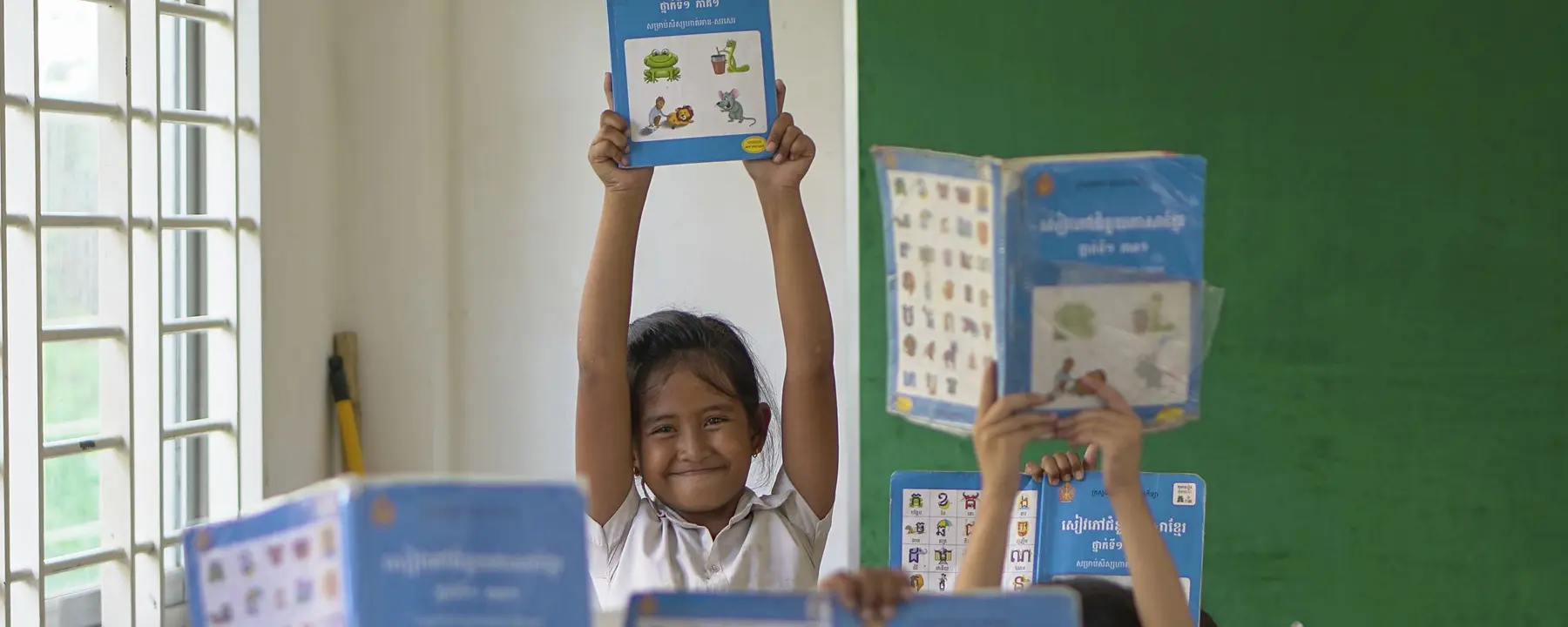Scaling Early Grade Reading in Cambodia
Photo credit: Ou Banung/ USAID IPEA
RTI uses cookies to offer you the best experience online. By clicking “accept” on this website, you opt in and you agree to the use of cookies. If you would like to know more about how RTI uses cookies and how to manage them please view our Privacy Policy here. You can “opt out” or change your mind by visiting: http://optout.aboutads.info/. Click “accept” to agree.

Photo credit: Ou Banung/ USAID IPEA
Improve early grade reading skills of all learners in primary schools in Cambodia.
Roll out a national inclusive early grade reading program and strengthen school governance, transparency, and accountability.
The Activity expects to train 8,923 teachers and support 223,693 students across four provinces. By the end of the project, over 6,683 schools will have adopted the early grade reading program, impacting over 734,000 students.
Despite strong government ownership of education improvements and rigorous ongoing reforms, Cambodia has struggled to improve student learning outcomes at scale. Equity is an issue, with insufficient learning support for students with disabilities and students from vulnerable groups, such as ethnic and indigenous minorities, leading to low attendance and increased risk of falling behind and dropping out for these children. Improving students’ mastery of foundational skills can help address these challenges.
The USAID Inclusive Primary Education Activity (IPEA) in Cambodia is a five-year (2021–2026) program to improve the reading and learning experience for primary students across Cambodia, including those with disabilities.
IPEA builds on the RTI-led USAID/Cambodia All Children Reading—Cambodia (ACR) and All Children Learning (ACL) projects, which worked with the Cambodian Ministry of Education, Youth and Sport (MoEYS), and the Global Partnership for Education, to develop, test, and pilot the learning materials for the government’s national early grade reading program, “Komar Rien Komar Cheh” (KRKC, Children Learn, Children Can Do).
In addition to helping Cambodia scale KRKC to schools across the country, IPEA is helping strengthen the capacity and resilience of Cambodia’s education system to address the needs of all students and transform its ability to improve learning outcomes.
A key pillar of IPEA is to enhance the capacity of teachers and school administrators to use KRKC’s early grade teaching and learning materials. Through targeted cascade training programs with cost-effective and sustainable approach, refresher trainings and mentoring activities, early grades educators have been equipped with effective and up to date KRKC pedagogical techniques, innovative teaching methods, and effective classroom management strategies.
In addition, IPEA has also supported other implementors of early grade learning programs in the education sector to align on teacher training modalities and materials, ensuring a common approach to developing a mentor support network, which includes training and reporting systems. This assistance has included training implementors at the national level, who have then gone on to further implement in additional provinces across the country, enabling KRKC to scale up and rollout out in 24 out of 25 provinces in Cambodia.
IPEA supports special schools to strengthen the quality of early grade education in Cambodia, with particular focus on children who are deaf and blind.
Working closely with the Education Quality Assurance Department, the National Institute of Special Education, and the Special Education Department, IPEA developed a Cambodian Sign Language (CSL)-based Early Grade Reading Assessment (EGRA) for use with students who are deaf or hard of hearing.
Following the successful development of this adapted EGRA, the team and collaborating government partners went on to develop a formative assessment toolkit and guidelines for regular use by teachers who teach through the medium of CSL to their students in the special schools.
IPEA has also adapted teaching and learning materials (TLMs) into Braille and CSL so that these students can meaningfully access TLMs such as flash cards, picture cards, and stories.
IPEA’s impact evaluation midline report, conducted in October 2023, shows the learning outcomes of Grade 2 and Grade 3 students have improved significantly. For example, Grade 2 students’ reading fluency increased from 18.2 words per minute (wpm) to 38.7 wpm, and Grade 3 students’ average rose from 30.6 wpm to 50.3 wpm.
To help contextualize these gains in mean scores detected in Grade 2 (six additional correct words per minute over control) and in Grade 3 (five additional correct words per minute over control), it is helpful to refer to a recently published 10-year retrospective of USAID early grade reading programming, conducted by EnCompass LLC, Management Systems International (MSI), TetraTech, and Data and Evidence for Education Programs (DEEP). This report, which examined 50 programs in 30 countries involving 70 million children, found that the average impact across all programs was an increase of three correct words per minute.
Reading comprehension also improved significantly. In Grade 2, 40% of students read with 80% comprehension (from 20% percent at baseline) and 57% of Grade 3 students read at 80% comprehension (up from 32% at baseline).
Learn more about our work in international education and in Cambodia
0 %
increase in Grade 2 reading fluency
0 %
increase in Grade 3 reading fluency
0 %
increase in Grade 2 reading comprehension
0 %
increase in Grade 3 reading comprehension